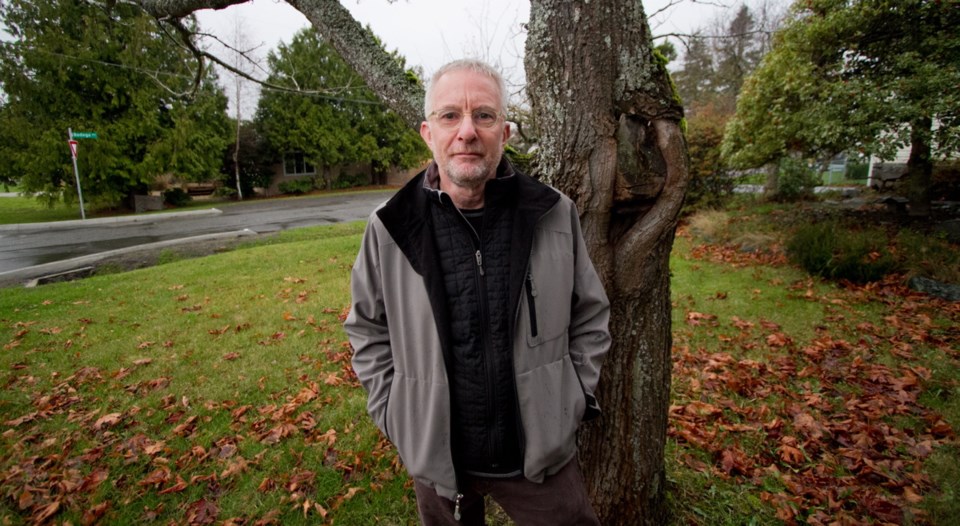Victoria’s vacancy rate is going up and rents are among the country’s highest but advocates for both tenant and landlord groups still say they are facing tough times. There are close to 50,000 rental units — purpose-built and in private homes in the Capital Region. And Russ Godfrey, Victoria advocate with B.C.’s Tenant Resource and Advocacy Centre keeps hearing from students, young workers and seniors who say they simply “can’t find anything affordable to live in.”
That’s despite a vacancy rate of 2.7 per cent, almost on par with the national average of 35 cities surveyed by Canada Mortgage and Housing Corporation and higher than recent years.
“The only thing that makes the lack of affordability go away is about a seven or eight per cent vacancy,” Godfrey said, noting that families are especially in a bind. A two-bedroom apartment rents for $1,059 on average, compared to a national average of $901, CMHC’s most recent figures show. And 60 per cent of City of Victoria residents are renters.
Al Kemp, Victoria-based CEO of the Rental Owners and Managers Society of B.C., said the true vacancy rate is probably close to six per cent. He called the CMHC numbers “way, way off” because they omit landlords with only a couple of units. Also, some landlords in larger buildings may be under-reporting their vacancies, he suggested.
CMHC’s report that Victoria’s annual rent increase was 0.9 per cent in the past year indicates that landlords have not always asked for the legal limit of 4.3 per cent this year, Kemp added.
Godfrey says that “most landlords give annual rent increases.” And CMHC never captures that, in between tenancies, landlords can set the rent at any amount they want, he added.
Even when tenants stay where they are, Godfrey said landlords can legally “circumvent rent control,” by using a system of “renew or vacate” leases. An annual lease renewal can be treated as a new contract, allowing landlords to charge what they think the market will bear, he said.
He raised the issue several times over the last year with the Rental Tenancy Branch, asking the province for a policy that limits lease rental increases to the rent-controlled amount.
“What they’ve told us is they’ll look at it but that was a year ago and they’re still looking at it,” Godfrey said.
A spokesman for the Ministry Responsible for Housing told the Times Colonist: “At this time, there are no plans to change the provisions of the Act relating to the end of a fixed-term tenancy.”
The province says the Residential Tenancy Act balances the rights and responsibilities of both landlords and tenants. Godfrey said that current legislation is far more balanced than what preceded it, but “renew or vacate” leases still mean that if tenants want to stay past the lease expiry, they’ll have to pay what the landlord wants.
The act states that at the end of the fixed term of tenancy, say a year, the tenant and landlord can either strike a new lease agreement or end the tenancy. “If a new agreement is struck, rent can be set at any point mutually agreed upon,” according to the ministry. But it’s hardly mutual, Godfrey pointed out. “Any time the landlord has the power of shelter over you, I would suggest that’s a power imbalance.”
He recommends that tenants stick to month-to-month leases to keep the rent increase in 2013 to the legal limit of 3.7 per cent, unless there are concerns of being evicted for landlords to use the property themselves.
Kemp said there are not many landlords taking advantage of lease renewals to raise rents and he’d like a better understanding of how much of a problem it is.
“Are there landlords that do that? Yes, there are. Is there one company that I know of that does that? Yes, there is.” He would not reveal which company, but said he has spoken to the company about it.
“It is 100 per cent legal,” Kemp said. “Whether it is the right way to run your business is a question that each person has to answer for themselves.”
Kemp said that annual rent control increases are based on the consumer price index, which has little bearing on landlords’ major costs. Property taxes, utilities and insurance are going up by nearly five to 10 per cent and “those are not discretionary items,” Kemp added.



